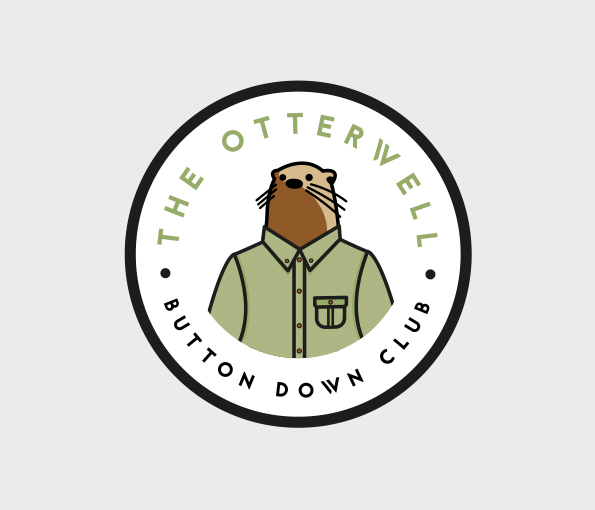The story of Otterwell is an interesting one. Originally created as part of a university course, the label’s first half-collection was put together in lieu of a written dissertation project.
The project was intended to assess students’ ability to create and run their own fashion business. Whilst other students were importing cheap Chinese products, such as fake eyelashes and the like, and documenting their modest success before moving onto the next module; Alex Otterwell and his mate’s idea grew into an actual business in its own right.
It was around six or so years ago. Roughly when workwear and heritage styles were becoming popular: a wave that included those bright yellow Albam Fisherman cagoules with Breton striped shirts; waxed Barbour’s and vintage 60/40 parkas from America. Crucially for the Otterwell story, a growing fondness for French style general work and baker jackets.
As opposed to sourcing cost friendly, off the shelf options from the Far East, the two students chose to look closer to home and sought to put together their own work jacket, with a more fashionable silhouette, and have it produced wholly in England.
A small number were made and sold via word of mouth in a few places the lads generally spent their time: around the campus, in bars and pubs, on social media and online clothes forums filled with nerds like us. They sold one. And another one. And another one.
They expanded from that one jacket onto a small collection, gaining a reputation with the aforementioned clothing nerds online. By the end of the degree, it all culminated in winning a business enterprise award and some handy start up cash.
It was not long after this initial, early success that the brand Otterwell disappeared into the ether until midway through 2015. Alex Otterwell, now solo, spent time working for Ben Sherman and Burberry during the intervening years, picking up valuable experience of how to survive in fashion retail.
From what he says, it seems that the paramount importance of quality, love and consistency that goes into the products and service at Burberry is what has shaped him the most.
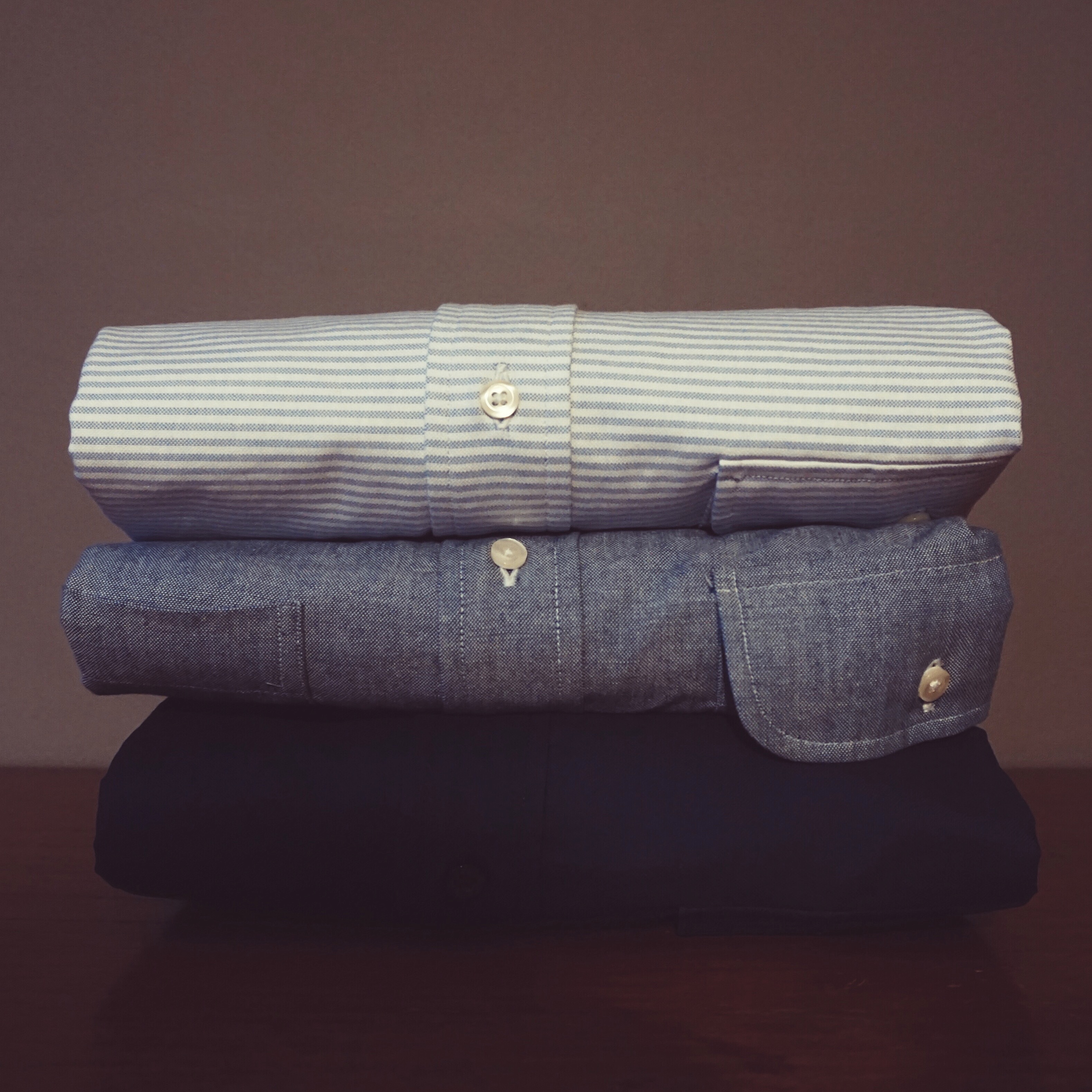
Alex; At some point, I did always want to go back into it [running his own label] but you learn more as you get older, don’t you? And I was always saying I wanted to get back into doing it when I was miserable in my old job. My wife kept saying, ‘Just do it.’ But I kept saying that I wanted to but I would do it next year, or the year after, but she said, ‘What’s going to change between now and next year, in terms of risk? You’re still going to have to get money out, you’re still going to have to do this, and this, and this, and take the same risk. Nothing is going to just change.’
So I was like; do you know what, fuck it, you’re right.
Proper; That’s true. You’re not going to win the lottery in the meantime, are you?
Exactly. You think that and you wait, don’t you, but what are you waiting for? So I just cracked on again. Started designing, started getting in touch with manufacturers and wholesalers – you know, like those shoes I’ve had in, and that?
Do you have much of a design background?
Just a basic one from Uni. It’s something that I’ll admit, I’m not a proper designer as such. I don’t know, I guess I am but I know people who design and they’re like artists almost. I’m not that but I think I know what a good jacket is or a good pair of pants.
I think menswear is quite simple really. Womenswear is quite intricate with all the drapes and different cuts and whatnot. Whereas menswear is more just straight lines and shapes so you don’t need to do anything too fancy, I don’t think.
That’s the most effective way of making something look good. You know a traditional Burberry mac or trench coat, when loads of other ones are compared to it, they aren’t as good; they’ll have stupid epaulettes or the pockets will be slightly too high, or whatever. The most basic one is usually the best. I think men, on the whole, don’t want to show off too much do they?
You’re spot on. You notice that, when designing, it can be quite easy to go over the top because when it is on CAD or even just in your sketchbook that you start with, it looks so simple that it’s easy to think ‘you know what, it looks too simple, it needs another pocket’ but it’s true.
I really like S.E.H Kelly, I think they’re one of the best new brands in the past, however many, years to come out of England because it is so classic and it is so wearable.
A lot of that is down to the fabrics; I’ve realised that it’s all down to the fabrics. What fabric you use is important and is pretty much half of your design because it affects how a jacket hangs or how the shirt sits on you. Trousers; if you want a turn up on them and you’ve used a shit fabric; you’ll get a shit turn up that won’t work and the overall aesthetic is gone. It’s a lot more about fabric in menswear, for me.
Did you learn about how to source the right fabric on your Uni course? As an outsider, just someone who enjoys buying clothes and writing the odd thing about them, I have absolutely no idea on where to start on doing something like that.
No, not really, it was so broad that we did a bit of everything. One day we would be designing shop fits on CAD, and the next day we would be looking at buying children’s wear and all the legal stuff that comes with it. The next day we would be looking at importing; the whole thing wasn’t aimed at thinking we would be buying anything in the U.K.
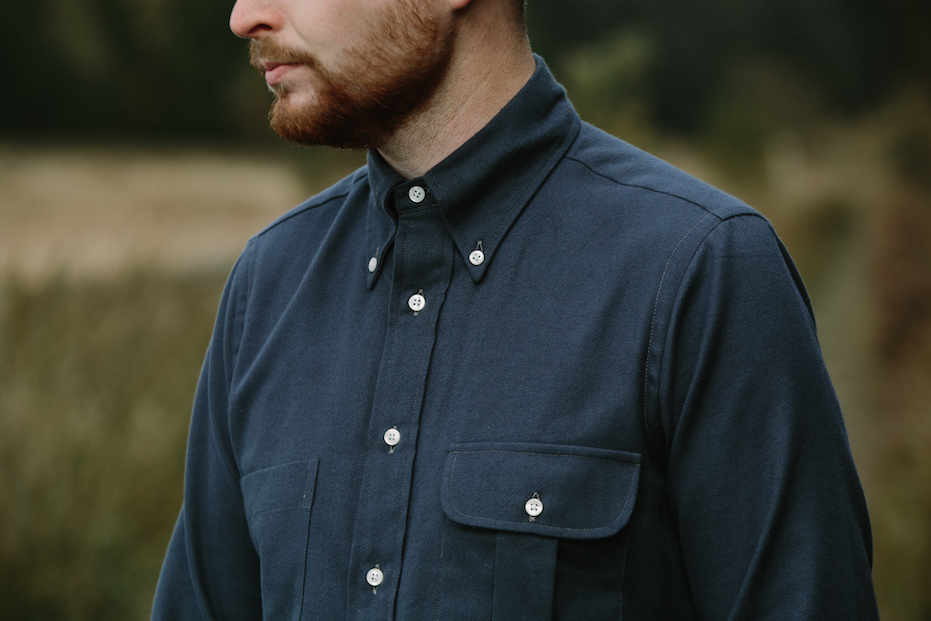
Most of the girls on my course ended up working at Matalan in Skelmersdale; they buy from overseas, you know, in big bulk orders, so the course was aimed at that side of the industry. So it wasn’t until we started doing Otterwell as that business project that we started finding out about sourcing different fabrics. Plus, to be honest, it’s all word of mouth. It’s such a secretive world because a lot of them don’t even have websites; they don’t even want you to know about them; they don’t even want to supply you. You’ve almost got to beg them.
Why?
They know you’re kind of small time, if you don’t know about them.
So won’t want to make, say, 10 jackets.
Yeah. They prefer trade fairs; that’s where they get their big business. They’ll go to Paris or Barcelona and that’s where you’ll get the big brands going, who buy over 1,000m of fabric and they’ll put the order in a year or two in front, because that’s how big companies work.
It’s frightening how far ahead they really are. So, these suppliers have got their big orders, they’ve got the money coming in when it’s done, so when somebody like me rings up and wants to make 20 jackets, they can be like, ‘why are we bothered about that?’
It’s hard when you are at this level and it is really all word of mouth. You often don’t find out about one company until someone from another tells you. You’ll speak to one maker down at the factory and they’ll be mates with some other people and put you onto them, say at Ventile, for example. They’re really great; they’re amongst the nicest people to work with because they’ll work with some of the biggest names in the world, say Nigel Cabourn but then they’ll also do my jackets too, along with the likes of S.E.H Kelly and 6876. They’re great and willing and their fabric is too.
What is about Ventile that’s so good from a design point of view?
Well, you’ve got the heritage immediately. You’ve got everything; it was a military spec’ fabric, they supplied it to the RAF. It’s really lightweight, for a start, when you feel it, when it’s rolled up, you think that this won’t be able to do anything with it but it’s great and it’s spun so tight that – I hate to say ‘waterproof’ because nothing is actually waterproof but – it’s weatherproof and if you tape the seams, nothing is really getting through, because it’s got such a good weave. It’s almost like our version of Goretex, if you will, but it’s cotton.
That’s the mad thing. The weave is so tight that it keeps the wind and rain out.
It looks classy as well; I’m personally not a massive fan of when a jacket starts becoming something towards the Berghaus end of things. Only because I wore those kind of jackets when I was a teenager, getting pissed on the park, do you know what I mean? I was wearing ‘em then but I don’t want, you know, to have grown up and be going to the pub with my missus, wearing something that I also wear for going rambling. You still want something which looks the part and you can make a great parka style jacket or an anorak and it just looks a bit classier in ventile. It’s just great. You can even just bang it in the washing machine and wash it. It’s got everything.
What did you drink on the park?
Erm, I had white lightning but it’s terrible, you’d be dying for about two weeks after.
I couldn’t stand it. I used to have this dead cheap vodka…
What was it called? Do you remember the name?
Vladivov, or something?
Yep. We used to get that. You used to be able to get like a small, hip flask bottle for about three quid.
Yeah, them! And it was in the paper once that it turned out that it actually had rat poison in and I was laughing at the article in the paper, but my dad went mental saying I should only ever drink proper alcohol.
Yeah ha-ha, I used to try and save up my dinner money each week then, on Friday, ask my dad for some chippy money and spend that on beer, but he knew. But yeah, I remember that vodka from when I was about 13, being rough as rats and now I can’t drink vodka anymore.
You took the words right out of my mouth. So where were you then, then? Where are you from originally?
I’m from Oldham. I know a few people who say they are Mancs from where I’m from but nah, I’m from Oldham.
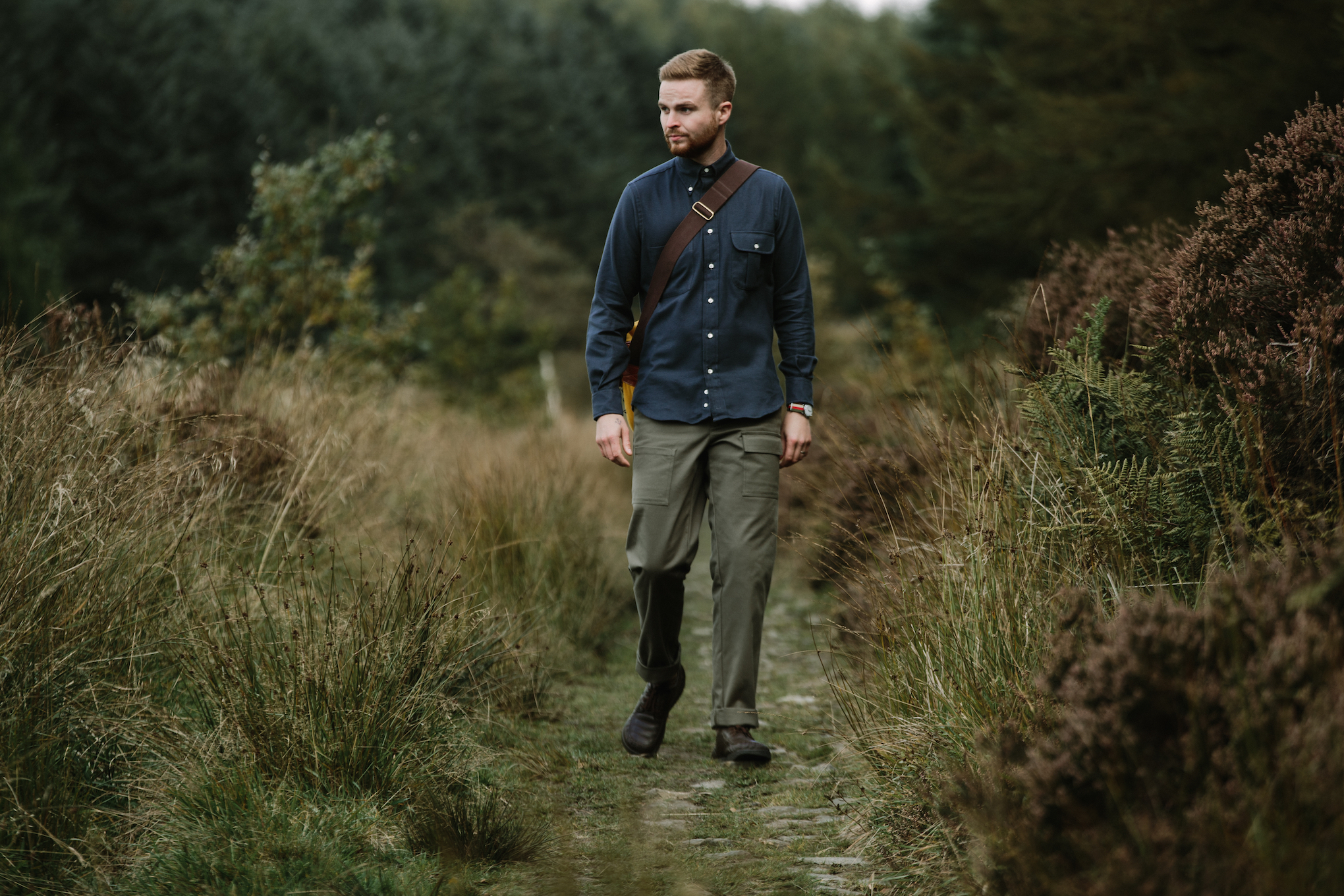
Can you talk a bit more about Burberry and what you did there?
Burberry, I had a bit of a journey there. I started there when I was at Uni and was part-time and then, after Uni, I left and got a manager job at Ben Sherman and then they asked me to go back to be a department manager; I wasn’t ready to be a store manager, there. So, I used to manage men and ladies wear. I learnt a lot there and they were a really good company to work for. I did about six years in total there, over two spells.
Didn’t you work at Oi Polloi?
Ha-no, I didn’t work at Oi Polloi. There seems to be always be this thing where people think I have done but, no, I never worked there. The thing is, once you’ve worked in “luxury retail”, the money is a lot better than anywhere else and – this sounds really terrible – you’re always going to stick to that, once you’ve had a taste of it, even if it’s not your main style.
You get accustomed to it…
It’s one of them; more money. Sometimes it comes down to that with a job, doesn’t it?
I found that interesting in what you said [meaning a post Alex put online the week before] – by the way, I always find this dead weird, when somebody says something on the internet, not directed to me in particular, but then I speak to them about it like it came up in a conversation we were having –
Yeah, I know what you mean…
– but the stuff you said about training the staff [at Burberry stores across the world to a similar level, in order to offer a uniform shopping experience] and training to spot customers, from the likes of the Far East, coming over to the UK and buying, like, 20 scarves to sell on in China in their own store.
Yeah, parallel trading. Like I say, as someone said in a reply, you think ‘why bother?’ but you’ve got to think of your brand, you’ve got to think of the whole experience.
They’re great at that are Burberry, it has to be so uniform, to the point where some people might think its impersonal, but it’s not; if someone is spending thousands of pounds at once, it’s got to be one of the best experiences of their life. You’ve got to look after them. It’s not supposed be like just going into any shop and buying, I don’t know, a single shirt or something and walking back out.
I suppose, as well, that’s the thing, their items aren’t supposed to be disposable, so why would the purchasing be?
Exactly. That’s something I keep putting across… I put something on one of my Instagrams the other day. I put something the other day and one of the lads on the [Casual Connoisseur] forum sent me a message saying I was “like a Gandhi or David Brent of menswear, but I can’t decide.”
Ha-ha! That’s brilliant. Who was that?
It’s Jack. Ha-ha-ha! I said, something like, “Buy better. Buy less.” And he said, “You’re either the David Brent of Gandhi of menswear but I just can’t decide.” But I was trying to go on about that you shouldn’t just buy something for a particular season, try and spend a bit more and try and buy something which is really gonna last for you.
Everything I buy, I try and buy something that isn’t going to go out of fashion and will stay, as it should do. I think Burberry really taught us that. For example, the trench-coats; they’re made in Yorkshire and you get to meet a lot of the staff who make them, in the shop, because they get vouchers for, I think, £500 for every 5 years of service, and they never spend them! Some of them have thousands and thousands because they’ve been there for 40 years, or whatever. Anyway, you ask them, “Oh, what’s your job?” and they say things like, “I stitch the collars together” or “I sew the buttons on, by hand.” And I’ll ask, “How long have you been doing that?”
“Oh, since school.”
“Since school? You look about fifty!” And they just say, “Yeah, I am” and it’s mad, but it’s all they’ve known because they are made in this little manufacturing town in Yorkshire.
It was probably sensationalised a bit, but I remember a news report once, or a documentary, years and years ago, and Burberry were cutting down the hours or number of jobs there, or something like that, and there was all these dead working class, typical factory workers, properly kitted out in house-check fabric. Not in a ‘chavvy’ way, just more of a “well, I can get these for cheap through work so of course I’m gonna wear ‘em”, kind of way.
Ha-yeah, exactly, they do. And they are a really working class kind of people, it’s an old mining town, where they make them, so it’s kind of one of those things where, in days gone by, everyone went and worked down the mine, but now everyone makes coats. They all lived on the same street too it seemed like.
Yeah, The Burberry Town or Burberry Street, I think they called it, on the T.V. programme.
It’s crazy but it’s true; Burberry really look after their staff, that’s why people stay there so long.
Just like their product – it’s supposed to last, the owner is supposed to primarily use it but also take care, take pride in and appreciate it, and therefore keep it for a long time; that starts with your staff, clearly. It seems a mind-set throughout the company.
Something that stood out from what you just said was the idea of buying less and buying better. I remember, when I was around 16-17, during that phase you mentioned of going out getting pissed on the park, and for a bit after once I started going out in town, I used to always want something new for going out in, be it a t-shirt or a jumper. But then I’d get photographed in it and think I needed something new then. Needed it because I didn’t want to look like I was wearing the same stuff, all the time. Now, I’m the complete opposite, I think I’ve only bought about 4 things this year, but it’s more fun and more enjoyable.
Yeah, I know what you mean, I think it’s just part of growing up though. Also, I wouldn’t wear now much of what we would have worn when we were younger though.
Do you remember Fake London Genius?
Yeah, I remember wearing their stuff to Sixth Form. I had this pair of jeans with, like, a big cross and a chain.
The chain – I forgot about the chain. They had almost Nazi insignia on their stuff; I remember a t-shirt with the Iron Cross on (it also had a very SS style skull on it).
And Evisu jeans, they were my first pair of proper Japanese denim. I didn’t know the first thing about Japanese denim, they just had a big Evisu logo on so I thought they were cool.
Yeah, Craig David had a pair on Top Of The Pops, so I wanted a pair.
Ha-ha. They were great at the time, but I think you make a good point about buying four or five things. I did for GearThereEverywhere my top three jackets and number one, still now, is a Harrington. I’ve got some coming for the shop. I just love them that much. I think it’s the best classic jacket. I love Harringtons and they never go out of fashion. They come more in and more out, at times they might not be the coolest jacket in the world but, it’s one of them, if you’re ever stuck on what to wear, put a Harrington on, put a button down on, a pair of nice dark denim or something, and you’re off, you can’t go wrong. And if you look at pictures of that in 10 or 20 years time, you’ll still look mint. People enjoy looking at the old Steve McQueen pictures; it’s because he kept it so simple.
I love white t-shirts for that. You can easily build pretty much anything around it.
A good fitting white t-shirt is perfect. I read some stuff by a designer, before, saying that if you can get a plain, white t-shirt and a pair of jeans to look good; you’ve cracked it. If you get that looking right, you don’t need to do anything else. You’re off.
Not looking like you’re forcing it, isn’t it?
I know what you mean but, at the same time, I’m terrible, me. I’m always reading fashion – and I know fashion is almost a banned word amongst blokes – and the theory behind fashion and style. It’s my passion.
I’m looking round my house now and I’ve got so many books, my missus is into it as well, and I love the theory behind it, especially for men, and how it changes. The more you read about it and the more you hear about it from top designers, stylists or whatever, they all sort of say the same thing; “it’s about style over fashion, it’s about keeping it simple, it’s about the cut and the fabric you use.” Which is sort of what we said and I like that thing where, if you think like that, and you see something that just fits, you’ll look and think, “yeah, I like that.” When I was doing the shirts for Otterwell, even though they are just simple button down shirts, I wanted to get them made in America.
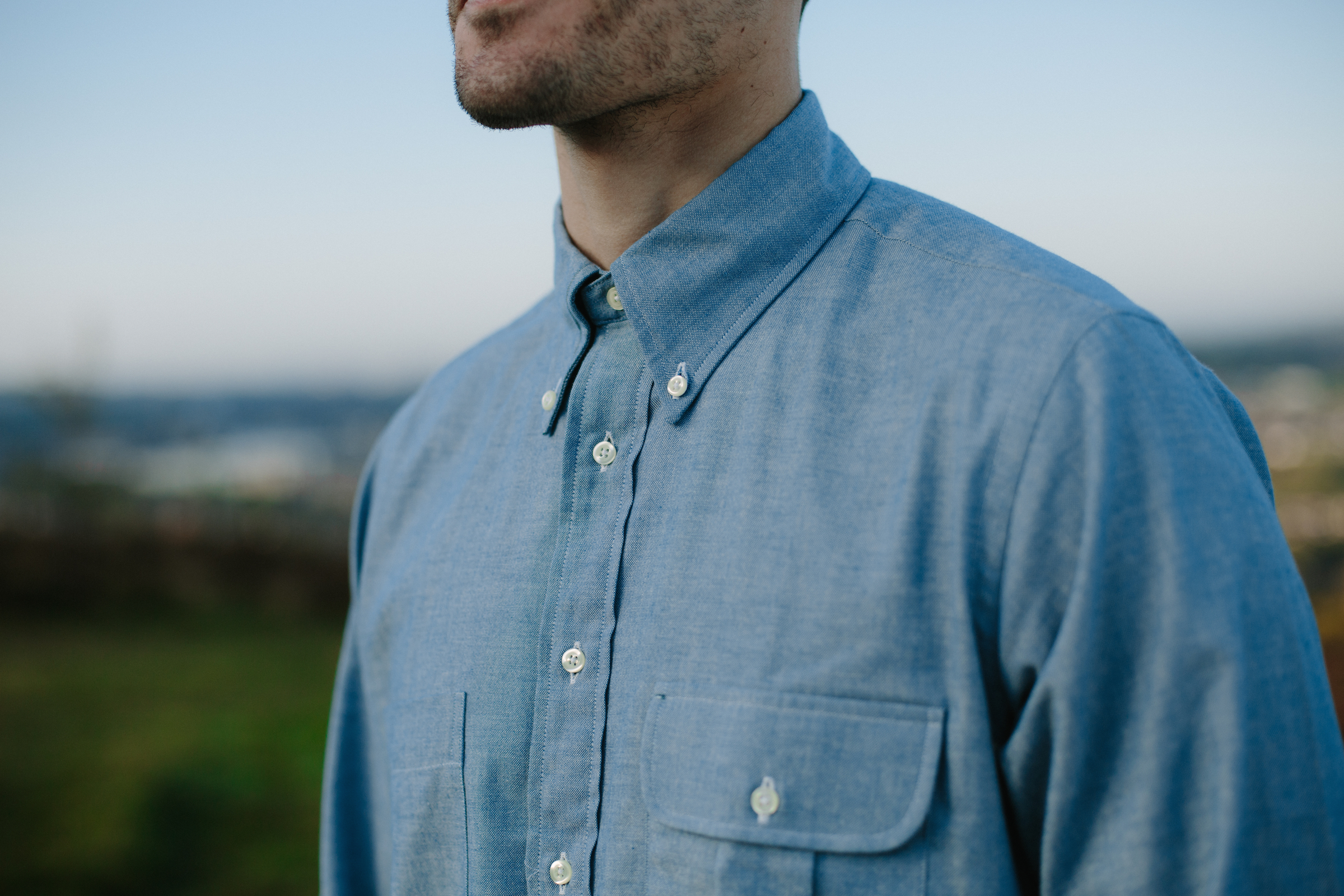
Have you been out there to see them?
No, sadly not, but there has just been lots of Skype meetings, lots of samples going back and forth, all because, comparatively, you can’t get a shirt like them made in England because they are an original Ivy League factory that made shirts for the original Ivy boys in the 50s.
Like you’d read in J.D. Salinger, or something.
Yeah, exactly, they’ve got the history; they know how the placket needs to be, to look right; the collar needs to have a certain roll to it, to look right; but you can’t explain these things to someone else.
Even though it is such a simple design, you can’t get them on the high street, here, because something like the collar will be slightly the wrong size, the roll won’t be just right, or the placket will be just too thin. The design is so simple that, once you get it right, you don’t need to change anything.
What do you make of the Uniqlo oxford shirts.
I think they’re really good. I hate to say it because of what I just said about the high street, it’s almost soul destroying. I don’t want to start slagging Uniqlo off, it’s… well, where are they made? Who’s making them? Where are they getting the fabric? I always think if something is too good to be true when it comes to price it usually is.
But then they aren’t your competitor, are they?
No. No they’re not. I think someone who buys my stuff is somebody who has an interest in where it is made, who has designed it, and all that. I could go and just get something Made in England and badge it as that, and we did that in the beginning, but we haven’t really got the right fabrics available here.
I found it really difficult to get the right kind of shirt made here, that was exactly what I wanted, that was more like a Gitman shirt; they do it best when they keep it simple, the are doing some mental prints at the minute but, generally, they’re the best.
I’d say to people who are happy to buy an Engineered Garments shirt at £150, “try one of mine, they come in at £130 and, you know, they’re just as good; they are made by one of the best shirt makers in the world, easily.
It’s a funny one when you try and justify it, but that is something that they taught us at Burberry; you should never try and justify why something costs so much, it should be undoubted because the customer should know they have gone to the best available: the buttons are a superior quality; the label has been specially woven; it has been made by someone who is an artisan, someone who has been doing that one thing all their life, someone who doesn’t just see it as a job but they are proud; it’s not just a production line; the quality control is that bit more rigorous. The more money you spend on something, the higher the quality should be, so you’d be surprised how many things are written off if they aren’t right.
When I first went in Burberry at Cheshire Oaks, I thought they were seconds.
No, they don’t do them. They just write them off. The outlets are what we couldn’t sell in the shop.
Yeah. Absolute jackpot though sometimes – I got a Brit mac for £150.
Yeah, I got one from Cheshire Oaks, too, single breasted, probably the same one.
So, lastly, have you any plans to go over to the US to see the factory and stuff, you seem pretty into your Ivy look?
I change my mind daily; one day I think I really like the Ivy League stuff and then the next I’ll like the heritage or military stuff, then the day after more skinhead stuff. My mind’s crazy, I kind of worry about how much it’ll change around.
Are you a Libra? They reckon Libras are like that.
Scorpio. My missus goes mad at it, I shaved my head the other week and she says, “I thought you were growing it?” And I was just like, “Yeah, I know, but I got bored on the day.”
I do like the Ivy style though and I was speaking to the guy who owns the factory, where they make our shirts, and he messaged me yesterday asking what my plans were for the summer and asking if I was going out to Pitti, he said we could meet up and have a beer. But I can’t really afford to go because every little bit of profit is going back into the business, at the minute, trying to make it bigger.
Tell you what, I’ll get onto Neil and Mark, tell them we want them to fund us to go, get us a flight and a load of ales, then try and cobble an article together out of it once we meet these shirt makers. [Ed; Good luck with that.]
I’d love to do that; go and do all the peacocking around. It looks great doesn’t it.
I love it when you see everyone in the hats and suits and all that, then you see the Oi Polloi team just looking like the most North Western guys in history.
Yeah, I loved that image that came across, didn’t it, where someone put something about them not getting the memo. But they stood out and looked class in a pair of Reeboks.
And what else have you got coming online?
The parkas are up next, need to get the trousers and the jacket. Some tote bags in a more technical fabric. I’ll see how the parkas go down but maybe some more of those in a new colour. And definitely some more shoes.
They seemed to fly out.
I know, mostly through Instagram too but I took a chance with those [the Duck Feet] as nobody else really stocks those, but thankfully it worked. I’ve got the Harrington coming in the New Year, the Baracuta ones, and a few others are in the pipeline – but don’t mention those yet until they are 100%.
And you’re selling all those?
Yeah. That’s the plan. I’m trying to grow it organically, almost – if I can make a comparison – sort of like Norse, you know, how they sell their own stuff alongside other brands. That’s the sort of end dream.
Does a physical shop feature in that dream?
A; Yeah, deffo. I want a shop with my own chosen brands in there, all sitting next to a load of Otterwell stuff.
Well, when you’re opening, give us a shout.
Aye!
Thanks to Alex for taking the time out to take part in Talking Threads. If you’d like to be sound and have a chat loosely centred around clothes, get in touch with Neil or Mark.
